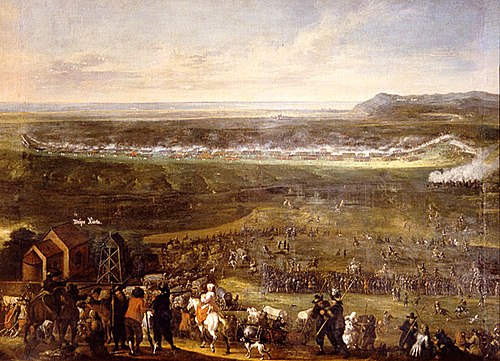Year 1677 Overview
1677 (MDCLXXVII) was a common year commencing on Friday in the Gregorian calendar, and a common year starting on Monday in the Julian calendar. It marked the 1677th year of the Common Era (CE) and Anno Domini (AD) designations, the 677th year of the 2nd millennium, the 77th year of the 17th century, and the 8th year of the 1670s decade. As of the beginning of 1677, the Gregorian calendar was 10 days ahead of the Julian calendar, which continued to be in localized use until 1923.
Events
January–March
January 1 – Jean Racine’s tragedy Phèdre is performed for the first time in Paris.
January 21 – The first medical publication in America, a pamphlet discussing smallpox, is produced in Boston.
February 15 – Four members of the English House of Lords embarrass King Charles II during the opening of the “Cavalier Parliament” by declaring the session illegitimate due to its year-long inactivity. The Duke of Buckingham, supported by Lord Shaftesbury, Lord Salisbury, and Baron Wharton, attempts unsuccessfully to end the session. After refusing to apologize, the four Lords are arrested and imprisoned in the Tower of London.
February 26 – The first arrests in what will become known as the “Affair of the Poisons” occur in France, as Magdelaine de La Grange and her alleged accomplice, Father Nail, are detained on suspicions of poisoning her lover, Monsieur Faurie.
On the island of Java, Amangkurat II of the Mataram Sultanate agrees to place his kingdom under the protection of the Dutch East India Company to combat rebels.
February 28 – The Siege of Valenciennes by the French Army begins during the Franco-Dutch War. The city capitulates on March 17.
April–June
April 6 – Leopold I, Holy Roman Emperor, visits the University of Innsbruck.
April 11 – The Battle of Cassel occurs, where a French force under Philippe I, Duke of Orléans, triumphs over a combined Dutch-Spanish force led by William of Orange.
April 16 – The Statute of Frauds is enacted into English law.
May 29 – The Treaty of Middle Plantation is ratified, establishing peace between the Virginia colonists and local Indigenous tribes.
May 31 – During the Scanian War, the Battle of Møn takes place, where Danish forces defeat a Swedish fleet commanded by Niels Juel.
June 25–26 – The Siege of Malmö occurs, with Danish forces unable to capture the town from the Swedes.
July–September
July 14 – In the Battle of Landskrona, Sweden successfully repels a Danish invasion force of 12,000 troops led by King Christian V.
August 14 – William of Orange is compelled to lift the siege of the city of Charleroi in the Spanish Netherlands after only six days.
August 28 – During the conflict between the Russian Empire and the Ottoman Empire, Russian troops and Ukrainian Cossacks inflict heavy casualties on the besieging Turkish forces in the Ukrainian city of Chigirin.
September 10 – Henry Purcell is appointed as a royal musician to Charles II of England.
September 17 – Danish troops invade and capture the Swedish island of Rügen.
September 18 – The Kangxi Emperor of China awards titles and ranks to his wives, naming Empress Xiaozhaoren as his consort.
October–December
October 29 – Michel le Tellier becomes Chancellor of France.
November 4 – The future Mary II of England marries William of Orange in London.
November 16 – French troops occupy Freiburg.
December 7 – Father Louis Hennepin becomes the first known European to discover Niagara Falls during his exploration of North America.
December 9 – The French Navy, led by Charles de Courbon de Blénac, lands on the island of Tobago, laying siege to a Dutch fort.
December 15 – The Siege of Stettin ends as Sweden surrenders the city to Prussia’s Frederick William.
Date Unknown
- Yusuf Bey is replaced as sanjak-bey of Lajjun Sanjak.
- The Second London Baptist Confession of Faith is composed.
- Spinoza’s Ethics is published as part of his Opera Posthuma.
- Robert Plot releases The Natural History of Oxfordshire.
- Elias Ashmole gifts the collection that initiates the Ashmolean Museum to the University of Oxford.
- Jules Hardouin Mansart begins work on la place Vendôme in Paris.
- Antonie van Leeuwenhoek observes spermatozoa using a microscope.
- Ice cream gains popularity in Paris.
- The population of Paris surpasses 500,000.
Births
February 3 – Jan Santini Aichel, Czech architect (d. 1723)
February 4 – Johann Ludwig Bach, German composer (d. 1731)
August 27 – Otto Ferdinand von Abensperg und Traun, Austrian field marshal (d. 1748)
September 17 – Stephen Hales, English physiologist, chemist, and inventor (d. 1761)
October 20 – Stanisław Leszczyński, King of Poland (d. 1766)
Deaths
January 8 – Sir John Fowell, English politician (b. 1623)
January 18 – Jan van Riebeeck, founder of Cape Town (b. 1619)
February 21 – Baruch Spinoza, Dutch philosopher (b. 1632)
May 4 – Isaac Barrow, English mathematician (b. 1630)
November 2 – Robert Sidney, 2nd Earl of Leicester, English politician (b. 1595)

